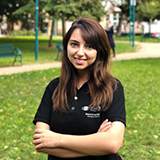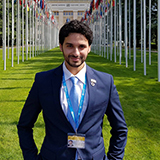“Young people of today are the leaders of tomorrow.” “Everyone should have a seat at the table.” “Nothing about us without us.” These are the new mantras that have been heard at recent high-level health meetings in Geneva, Astana, and New York. Youth-led organizations are increasingly present in global health spaces and they are advocating for more meaningful engagement of young people in global agendas. Not waiting until tomorrow or their turn, but truly leading now and catalyzing change in their communities.
The United Nations recently launched its first Youth Strategy “Youth 2030”, and other organizations, including the World Health Organization, have followed endorsing the need of meaningful partnerships with young people. [1] However, rhetoric alone does not lead to change, it must be followed by commitments and action. This means making space for youth to take seats on high-level commissions, advisory boards, and decision making bodies. Youth need to be active in facilitating global and country-level consultations and events such as hackathons to create innovative solutions. Meaningful youth engagement and power sharing requires resources and normalization of the presence of young people at every table—not as tokens and decorations—but as equal partners and experts on their health. [2]
Young healthcare professionals are capable of providing valuable contributions, when given the opportunity. Many young professionals are, or soon will be, frontline healthcare providers and global health advocates who play a vital role in tackling health-related challenges worldwide. This requires their early interaction with health systems and policy-making, to enable them to address the needs of their communities. Our recent experience proves that meaningful youth engagement is possible even in highly technical and complex processes like guideline development. The recently started development of new normative guidance from the World Health Organization on self-care interventions for sexual and reproductive health and rights includes young people serving as key participants in the process. Youth were engaged from the earliest stages at multiple levels in various consultations at high-level meetings and focus group discussions. They were also involved in conducting reviews and encouraging youth to put forward points and topics for discussion that were important to them. Moreover, two of us were part of the Guideline Development Group which provided an equal opportunity to participate with adult stakeholders in every discussion and in voting on every recommendation.
What have we learned about meaningful engagement with youth in global health? Most importantly, youth engagement should not be an exception or a one-off opportunity for a lucky young individual; it should be a comprehensive and inclusive process. This means reaching out to a wide spectrum of youth groups early in the process, establishing fair opportunities and clear terms of engagement. The UN recognizes an eight-step continuum of participation with the highest level of youth engagement being achieved when young people are given the opportunity to be decision makers, and to act as leaders and pioneers in their fields of experience. [3]
No single individual can represent all youth voices so including balanced gender and geographic representation with adequate involvement of vulnerable and marginalized groups is crucial. Regardless of where you are from, whether it is a resource poor setting or a humanitarian zone, there should always be a chance for your voice to be heard and represented. Equipping youth with technical skills, providing support, and implementing equitable capacity building opportunities would improve diversity of young people involved, and should be a principle of all actors in the global health landscape of today.
Reorienting current systems to give more power to young people and make use of their expertise are key steps towards achieving the Sustainable Development Goals. This agenda is in the hands of 1.8 billion young people of today who will carry it until 2030 and beyond. Young people are not waiting, they are truly leading now.
Authors would like to thank Manjulaa Narasimhan from WHO Department of Reproductive Health and Research for creating opportunities for young people and communities to actively participate in WHO work.
 Michalina Drejza is a medical doctor from Poland. She is completing her masters in Reproductive and Sexual Health Research at the London School of Hygiene and Tropical Medicine. @MichalinaDrejza
Michalina Drejza is a medical doctor from Poland. She is completing her masters in Reproductive and Sexual Health Research at the London School of Hygiene and Tropical Medicine. @MichalinaDrejza
 Batool Al-wahdani is the President of the International Federation of Medical Students’ Associations (IFMSA). She is a medical doctor from Jordan. @BatoolWahdani
Batool Al-wahdani is the President of the International Federation of Medical Students’ Associations (IFMSA). She is a medical doctor from Jordan. @BatoolWahdani
 Tarek Turk is a doctor from Syria. He is a resident in Dermatology and Venereology. @tarek_turkk
Tarek Turk is a doctor from Syria. He is a resident in Dermatology and Venereology. @tarek_turkk
Competing interests: MD has been working as a consultant at the WHO Department of Reproductive Health and Research supporting the development of the guidelines on self-care interventions for SRHR. BA and TT have been members of the Guideline Development Group. This work was funded by the UNDP-UNFPA-UNICEF-WHO-World Bank Special Programme of Research, Development and Research Training in Human Reproduction (HRP).
References:
- United Nations (2018) Youth2030: The United Nations Strategy on Youth https://www.un.org/youthenvoy/youth-un/
- Global Consensus Statement on Meaningful Youth Engagement (2018)https://www.who.int/pmnch/mye-statement.pdf
- WHO (2018) Engaging young people for health and sustainable development, Strategic opportunities for the World Health Organization and partners http://apps.who.int/iris/bitstream/handle/10665/274368/9789241514576-eng.pdf?ua=1
